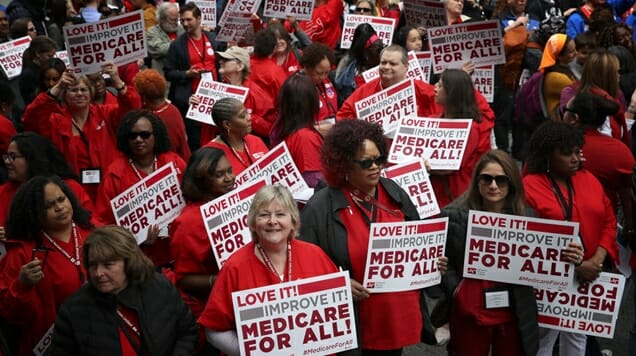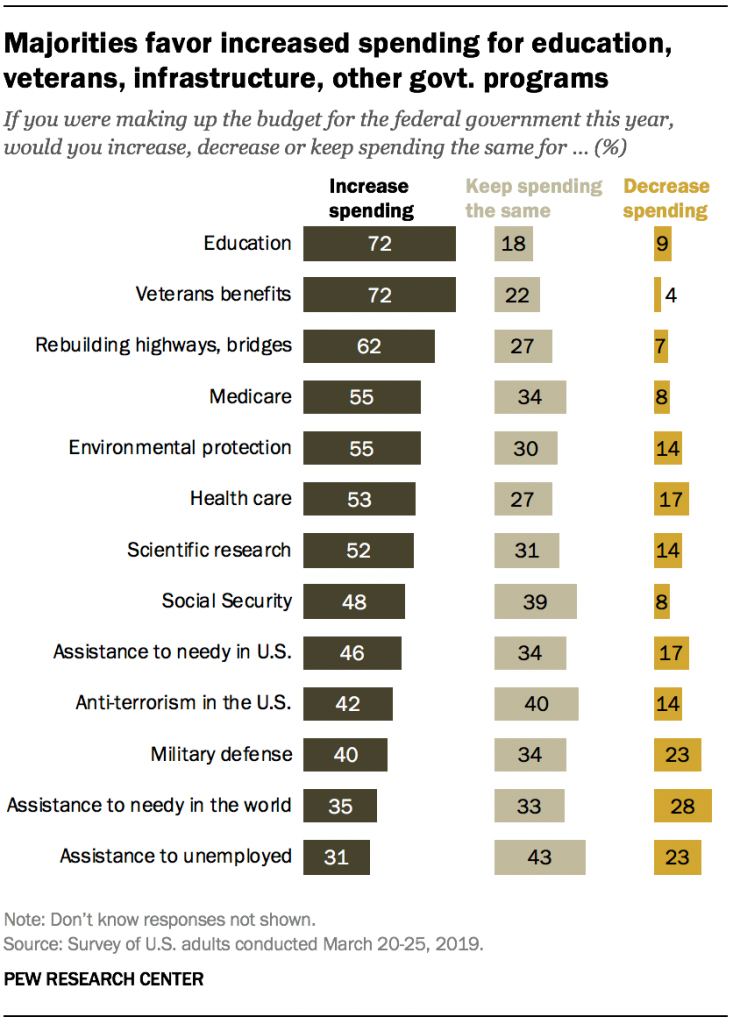“Free Stuff” Is Popular. It’s Why Trump Is Afraid of the Left
Photo by Win McNamee/Getty
Prior to entering journalism full-time, I worked in sales for my entire 20s, and it taught me some invaluable lessons about politics. First and foremost, people are far easier to persuade using an emotional appeal than a rational one. This has nothing to do with intelligence and everything to do with basic human nature. I know this to be the truth because I have been near the inside of the trillion-dollar industry at the heart of the economy. Despite everything being based around numbers in merchant services, the sales pitches I gave to business owners were centered entirely around emotional manipulation, while hiding the truth behind the byzantine system of fees imposed by VISA, MasterCard and the banks on small business owners.
These pitches were so effective that brand new college grads were easily taking home $100k per year just by mindlessly following the script. This emotional reasoning is an aspect of human nature that Republicans have demonstrated a thorough understanding of time and time again, while liberals have adhered to a false belief in the ubiquity of logic and reason. It’s not that people cannot be persuaded using logic and reason, it’s just that it is much easier to make an emotional appeal than an analytical one. Sales folks win the moment you trust them, not necessarily the product.
Which brings me to the two best words in the history of sales: new and free. They are the convergence point between our emotional brain and our rational one. Our rational brain can easily understand the potential benefits to a product that can be described by those two magical buzzwords, and the dopamine rush of being first and getting something for nothing reinforces the power of “new” and “free.”
Trump understands this. While he is terrible at pretty much every other aspect of life, he is a very good salesman. Sales is not about making a logical argument as to why your customer needs X—usually folks already know that before they make the call—but an emotional appeal as to why they should trust you. This is why every sales script ever repeats certain words and phrases over and over and over again—to reinforce trust on the most important topics. This is why Trump seemingly only has a vocabulary of about 46 words. Part of the reason I left sales is that having the same five to ten conversations all day every day made me feel like I was going insane—and as anyone who has had to interact with a persistent salesperson can attest, that goes both ways. If you continually hammer away at a certain angle(s), you can eventually wear the customer down, and they will accept your framing of things just so they can get what they want and get on with their lives.
If it sounds manipulative that’s because it is, and that’s why Trump is so preternaturally skilled at sales. Selling, lying and not hiding the fact that he wants to date his daughter are the only things that Trump is an expert at, and a Daily Beast report from last week reveals the sales training fueling Trump’s anxiety when it comes to the leftist uprising at the heart of the Democratic Party.
This year, Trump has repeatedly told friends and donors that running against “socialism” in a general election may not be “so easy” because of its populist draw, according to four Republicans and sources close to Trump who’ve heard him say this over the past several months.
According to a person who was in the room, Trump told donors at a recent private event that though “a lot of people think it’ll be easy to beat [in 2020],” the “truth is, it might not be so easy.” The president, according to the source, said that “you can have someone who loves Trump, but many people love free stuff, too.” He added that if candidates tell Americans, especially young voters—that they’re going to cancel their debt*, “that’s a tough one” to run against.
*Quick 2020 prediction: at some point in the campaign next year, Trump will pull one of his BS promises and just toss out support for free college or a pledge to cancel student debt once his historically-awful poll numbers with young people become a bigger story.
Socialism isn’t “free.” Benefits for the majority of the populace are not “free,” but the powers that be have branded both as such over the years in an attempt to play to the rugged individualist crowd and push libertarian policies that only benefit the oligarchs choking the life of our society, all while betraying some very basic rules surrounding American nomenclature in the process. Large majorities of Americans have absolutely no appetite for cutting most specific government programs, all the while, Republicans and conservative Democrats spent the last 40 years campaigning against the left by telling folks that the stuff they like is “free.”
That word is, uh, not a good one to use if you want to build opposition to a product. Imagine if Comcast launched ads attacking DIRECTV by describing its products as “free stuff.”
Support for all these government programs below is both a demonstration of America’s ideological predilection for economic liberalism, our belief in the power of government in general and, at least partially, a result of a successful branding effort on behalf of economic liberalism’s opponents.
There is this false belief which has taken root in America that people want to suffer—rather than have the government provide for those the market has left behind. Poll after poll proves that majorities (and sometimes large majorities) of Americans want what our elites have attacked as “free stuff.” This attempted denigration while using an objectively positive term has been such a failed branding endeavor that even more Republicans now support free college than oppose it.
This strategy against the left enacted by American power since the trauma of McGovern would have had 26-year-old me blackballed from selling anything ever again, let alone merchant accounts to business owners. “Free” is not a negative term, nor has it ever been. Free is free. Who the hell doesn’t want something for free? Even if it isn’t anything worthwhile, it cost you nothing.
Now, veering back towards logic and reason: this “free” characterization is simply untrue given the huge tax increases that are necessary to fund a socialist-ish state, and Republicans have done yeoman’s work on behalf of socialists by making their plans seem cheaper than they actually are. Trump even benefited from this half-century of bad marketing, in that he was the first Republican presidential nominee of millennials’ lifetimes to actively campaign on protecting liberal sacred cows—and the most consistently popular government programs in America since they were enacted—Medicare and Social Security. This staunch support of the welfare state objectively buoyed Trump’s campaign and made him even more popular with the retirees dependent on those two massive societal advancements made by liberal America. He almost surely does not create as many Obama-Obama-Trump voters as he did without his promise to protect one program that is definitely socialist (it even has socialism in its name!) and another that is a fusion of socialist ideals and capitalist systems.
Ironically, the party which better understands the ruthlessness and cynicism at the heart of sales utterly failed at selling folks on their libertarian policy vision, and by pushing the “free” aspect of liberal policies as a supposed negative (pushing it negatively or positively is secondary to the importance of slapping it on every liberal policy the way that Trump tattoos his name on buildings), conservatives have actively campaigned on behalf of vastly increased government spending by shrouding it in a marketable lie. For my entire life, Republicans and centrists alike have decried pretty much any kind of robust government spending as “socialism,” and today they are watching in horror as the two largest and most liberal generations in history approve of socialism more than they do of capitalism. These things are related.
Ending this on the other marketable buzzword helping to fuel the popularity of leftist policy: socialism is genuinely new for the vast majority of the voting public. The last serious push to make America look more like our European allies came in the 1930s with the passage of the New Deal, and another, narrower version of it was attempted in the 1960s with LBJ’s Great Society. Most Americans alive really have no actual concept of socialism in their day-to-day lives, so the exotic newness of socialism versus the familiar drudgery of capitalism becomes a serious draw before you even get to the facts of either ideology (let alone muddying facts, like how Bernie Sanders is a self-described New Deal liberal, despite proudly labeling himself as a Democratic Socialist).
Combine the freshness of socialism with Republicans and centrist Democrats denigrating “free stuff” and “free lunch” every chance they get for a generation, and you have the perfect marketing storm of effectively branding something both “new” and “free.” The inability of American elites to properly make their case to the public goes a long way in illuminating just how they let a carnival barker with only one demonstrable skill take over their whole damn beat.
Jacob Weindling is a writer for Paste politics. Follow him on Twitter at @Jakeweindling.








































